German consumers and the government drove economic growth last quarter, setting the country up for a
bumper year despite concerns that a stronger euro will weigh on exports.
Gross domestic product data published Friday showed households leading the charge as the economy expanded 0.6
per cent in the three months ended June. The growth matched an August 15 estimate and adds to reports this week suggesting that the euro area's largest economy is headed for its strongest annual growth since 2011.
Germany’s strength, bolstered by record-low unemployment, is helping drive a recovery in the 19-nation currency bloc that has prompted the European Central Bank (ECB) to start considering whether it can start to slow its monetary stimulus.
______________
Read more:
Why the world needs more leadership that's made in Germany
The little German city with big financial clout
______________
ECB policymakers will meet in Frankfurt on September 7 to discuss the path of their bond-buying programme, though investors are on guard for any clues when President Mario Draghi speaks in Jackson Hole, Wyoming, later today
Germany isn't immune to the wider concerns of the currency bloc. Wage growth and inflation remain subdued, and the euro's surge this year threatens to undermine the competitiveness of the country's exporters.
The Ifo Institute's index of German business confidence is predicted to show sentiment weakening from a record high when it's released. A measure of investor confidence this month slid more than forecast on concerns over
foreign sales and the nation's widening automaker scandal.
Still, a purchasing managers survey published this week indicated that the economy is on track to expand by more than 2 per cent this year, and the Bundesbank said growth may be stronger than the 1.9 per cent it forecast in June.

